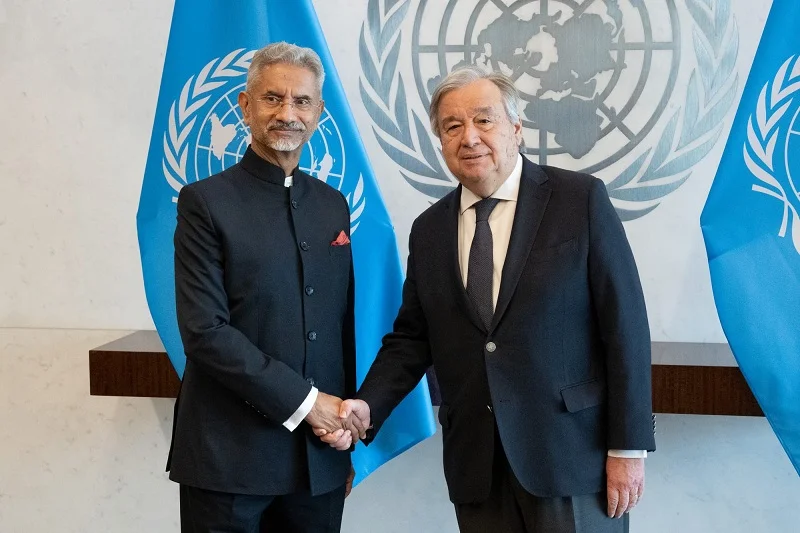India continues to work closely with the United Nations and other partners to establish safe corridors for the evacuation of its citizens trapped in the Sudan warzone.
On his way to the Caribbean, External Affairs Minister S Jaishankar stopped over in New York on Thursday to meet the UN Secretary-General Antonio Guterres to discuss the extremely volatile situation in the Northeast African country.
“Discussed the current developments in Sudan, G20 Presidency and Ukraine. Focus understandably was on Sudan. India strongly supports efforts towards an early ceasefire, leading to creation of safe corridors. Will continue to work closely with UN and other partners in this regard,” tweeted Jaishankar after the meeting just before he left for Guyana.
VIDEO | “In Sudan, the UN is making all efforts to establish a ceasefire. Unless there is a ceasefire, it’s not safe for people to come out. Our team is in continuous touch with Indians in Sudan,” says EAM S Jaishankar after meeting with UN Secretary General Antonio Guterres. pic.twitter.com/qYJQb10K9p
— Press Trust of India (@PTI_News) April 21, 2023
Guterres has appealed for a ceasefire to take place for at least three days, marking the Eid Al Fitr celebrations, to allow civilians trapped in conflict zones to escape and to seek medical treatment, food and other essential supplies.
At the same time, he admitted after Thursday’s meeting convened by the African Union on Sudan – which brought together the UN, the League of Arab States, IGAD (Intergovernmental Authority on Development) and the European Union, as well as representatives from a number of countries that are committed to solving the crisis – that humanitarian operations in Sudan are virtually impossible at this moment.
Humanitarian operations in Sudan are virtually impossible at this moment.
Warehouses, vehicles and other humanitarian assets have been attacked, looted and seized.
Targeting humanitarian workers and humanitarian assets must end.
They are #NotATarget. pic.twitter.com/MYww7nHHQ1
— António Guterres (@antonioguterres) April 20, 2023
On April 16, a day after armed clashes took place in Khartoum between units of the Sudanese army and the Rapid Reaction Forces, the Indian Embassy reported that Albert Augestine, an Indian national working in a Dal Group company in Sudan, got hit by a stray bullet and succumbed to his injuries.
With hundreds of Indians stuck in the war-torn country, the Indian Embassy stated that it has come across many instances of looting and advised all Indian nationals not to venture out, ration their supplies and keep essentials like medicine, water, money, passport, OCI card food ready with them to ensure easy mobility, when feasible.
Jaishankar, at the same time, had dialled his counterparts in the United Arab Emirates (UAE) and Saudi Arabia – countries that have a significant influence over the warring groups in the African nation.
It is estimated that, out of about 4,000 Indians in Sudan, around 1200 have now been settled for about 150 years. As the Indian community gradually grew and developed, it moved from the small towns in the eastern part of the country, including Port Sudan and Sawakin, to the interiors and settled down in Omdurman, Kassala, Gedaref and Wad Medani.
The dramatic events involving General Abdel Fattah Abdelrahman al-Burhan from the Sudanese army and General Mohamed Hamdan Degalo of the Rapid Reaction Forces have pushed back efforts to restore Sudan’s democratic transition.
Military operations using heavy equipment are taking place in the area of the Republican Palace, the main command of the Armed Forces of the Republic of Sudan, the airport, the central market, as well as near military bases in the south of the Sudanese capital.
The international airport is temporarily closed, and bridges over the Nile River are blocked. An escalation in tension is also reported in the city of Meroe, 500 km north of Khartoum.
The Indian authorities have, meanwhile, managed to move the body of the deceased Indian national from his apartment complex to a hospital mortuary and continue working on finding out a way to get the body back home or along with the family evacuated.
“If the situation on the ground improves and there is a pause in the fighting or there’s some formal ceasefire, we will certainly take advantage of that. Primarily to first, I think, to get people together in safe areas, provide food stuff, provide water, those kind of things,” said Ministry of External Affairs (MEA) spokesperson Arindam Bagchi on Thursday.
“But for the moment, it is a pretty tense situation where there has not been too much of a respite from the fighting, although the intensity has been going up and down from time to time.”
Also Read: India steps up efforts to ensure safety of its citizens stuck in Sudan’s warzone




















